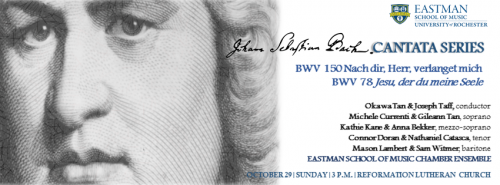Eastman’s 2017-18 Bach Cantata Series starts this coming Sunday. A chamber ensemble of instrumental and vocal soloists from the Eastman School of Music will present two sacred cantatas by Johann Sebastian Bach on Sunday, October 29 at 3:00pm at the Lutheran Church of the Reformation, 111 N. Chestnut St. The concert will feature BWV 150, “Nach dir, Herr, verlanget mich”, and BWV 78, “Jesu, der du meine Seele.”
The cantatas will be conducted by graduate choral conducting students Okawa Tan and Joseph Taff, and will feature vocal soloists Anna Bekker, Nathaniel Catasca, Michele Currenti, Connor Doran, Kathie Kane, Mason Lambert, Gileann Tan, and Sam Witmer. The performance is part of an ongoing series of Bach cantata concerts by Eastman students at the Lutheran Church of the Reformation. The performance is free and open to the public, and will be followed by a reception with the musicians.
The student conductors answered a few questions from Eastman Journal about the concert and about Bach’s great contributions to choral music.
Which of you is conducting which cantata?
Joe: I’m conducting BWV 78; Okawa is conducting BWV 150.
Can you give a brief description of what the cantata is about and what forces it calls for? Also any musical highlights?
Joe: Composed in 1724, Bach wrote Cantata 78 for the 14th Sunday after Trinity. It is part of a cycle of church cantatas that Bach based on Lutheran chorale tunes and texts – in this case, the chorale is Johann Rist’s chorale “Jesu, der du meine Seele.” Bach builds the first and last movements of the cantata around the chorale, in both cases featuring the chorale tune in the soprano voice – in between, a series of solos and duets echo the chorale’s themes (mostly awareness of one’s own sinfulness, and corresponding gratitude to Jesus for his redeeming sacrifice) without explicitly referencing the chorale tune. The cantata is scored for SATB voices, flute, two oboes, two violins, viola, and basso continuo (in this case organ, cello, and double bass).
Okawa: BWV 150 is one of Bach’s earliest surviving cantatas, and for the most part consists of chorus movements, with only one soprano aria. The reason for this might be the limited artist capabilities. It calls for smaller forces with only two violins, a bassoon, and basso continuo. The texts are based on Bible verses from Psalm 25: 1, 2, 5, and 15, with free-composed poem in between. The whole theme of this cantata talks about a believer asking for God’s guidance, justice, and protection in his suffering. Throughout his journey, which begins in B minor, through cross, death, and hell (portrayed with dramatic text painting in the music), God finally turned his suffering into joy and hope, and the cantata ends in a grand B major.
What is the significance of this repertoire in the history of choral music and also as it relates to your studies as a choral conductor?
Joe: Bach’s cantatas are definitely a treasure of the choral repertoire, despite it being unclear whether they really were “choral” music, or whether he just used four singers who sang the solos and the “choral” movements, as we are doing. They (in my humble opinion) represent German baroque sacred music at its most complex and eclectic, weaving together chorale tunes (familiar to these composers and their audiences as hymns sung in unison by the whole congregational) with imitative counterpoint, and interspersing solo recitatives and arias — an essentially dramatic style borrowed from Italian opera.
For conductors, this complex music demands pretty attentive analysis in order to work on clarifying some thick textures, and also demands a wide variety of conducting techniques (e.g. for secco recitative [accompanied only by the continuo instruments] vs. aria vs. homophonic final chorale). So it is a great opportunity for us to hone our craft, while also getting to share this wonderful music with our audiences.
Eastman’s 2017-18 Bach Cantata Series starts this coming Sunday, October 29, at 3 p.m. at Reformation Lutheran Church, 111 North Chestnut Street. Join conductors Joseph Taff and Okawa Tan as they present BWV 78 and BWV 150 with the soloists and Eastman Chamber Ensemble. Admission is free and a reception follows in the fellowship hall.
For more information, check out the event page.
For more upcoming concerts, check out the Eastman Rochester Choruses website.
